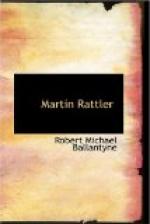In the course of the next day, to his great joy, he overtook a trading canoe, which had been up another tributary of this river, and was descending with part of a cargo of India-rubber shoes. None of the men, of whom there were four, could speak English; but they easily saw from the Irishman’s condition that he had escaped from enemies and was in distress; so they took him on board, and were glad to avail themselves of his services: for, as we have before mentioned, men are not easily procured for voyaging in those parts of Brazil. Three weeks after this they arrived at a small town, where the natives were busily engaged in the manufacture of shoes, bottles, and other articles of India-rubber; and here Barney found employment for a short time.
The seringa, or India-rubber-tree, grows plentifully in some parts of Brazil, and many hundreds of the inhabitants are employed in the manufacture of shoes. The India-rubber is the juice of the tree, and flows from it when an incision is made. This juice is poured into moulds and left to harden. It is of a yellowish colour naturally, and is blackened in the course of preparation. Barney did not stay long here. Shoe-making, he declared, was not his calling by any means; so he seized the first opportunity he had of joining a party of traders going into the interior, in the direction of the diamond districts. The journey was long and varied. Sometimes by canoe and sometimes on the backs of mules and horses, and many extraordinary adventures did he go through ere he reached the diamond mines. And when at length he did so, great was his disappointment. Instead of the glittering caves which his vivid imagination had pictured, he found that there were no caves at all; that the diamonds were found by washing in the muddy soil; and worst of all, that when found they were dim and unpolished, so that they seemed no better than any other stone. However, he resolved to continue there for a short time, in order to make a little money; but now that Martin had arrived he thought that they could not do better than make their way to the coast as fast as possible, and go to sea.
“The only thing I have to regret,” he said, at the conclusion of his narrative, “is that I left Grampus behind me. But arrah! I came off from the savages in such a hurry that I had no time at all to tell him I was goin’!”
Having sat till daybreak, the two friends went to bed to dream of each other and of home.
Next morning Barney took Martin to visit the diamond mines. On the way they passed a band of Negro slaves who encircled a large fire, the weather being very cold. It was at that time about the end of July, which is one of the coldest months in the year. In this part of Brazil summer and winter are reversed,—the coldest months being May, June, and July; the hottest, November, December, January, and February.




